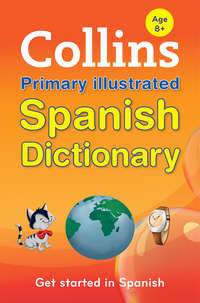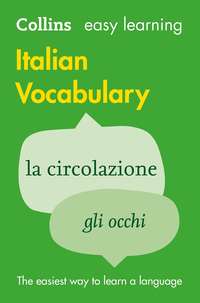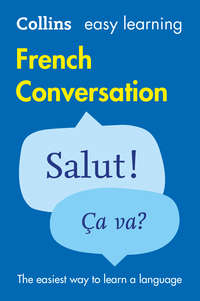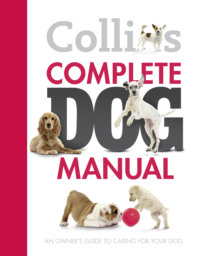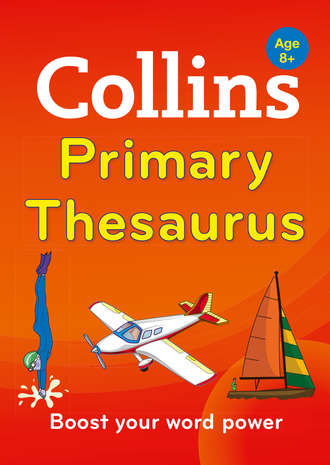
Полная версия
Collins Primary Thesaurus
If something breaks up, it comes apart.
disintegrate
Because of the explosion, the plane disintegrated in midair.
fall apart
My wonderful go-kart fell apart during its maiden trip.

breathless ADJECTIVE
If you are breathless, you are breathing very fast or with difficulty.
gasping
By the time we reached the ridge of the hill, we were gasping.
out of breath
My gran gets out of breath even when she bends down.
puffed out INFORMAL
After running for the train I was puffed out.
puffing and panting INFORMAL
By the end of the fathers’ race Dad was puffing and panting.
wheezing
The poor asthmatic girl was still wheezing even after using her inhaler.
bright (1) ADJECTIVE
Bright colours or things are strong and startling.
brilliant
The brilliant diamond glittered in the light.
dazzling
We stepped out into dazzling sunshine.
gleaming
I polished Dad’s car until it was gleaming.
glistening
The glistening dewdrop sat like a jewel on the leaf.
glittering
For the show, Mum made me a glittering dress with sequins all over.
glowing
The glowing fire lit the old cottage kitchen far into the night.
shimmering
The sun rose as the ship sailed out onto the shimmering sea.
shining
The shining stars lit up the night.
twinkling
From the opposite shore we could see the twinkling lights of the town.
vivid
The parrot’s feathers were vivid shades of red, green and blue.
ANTONYMS: dim or dull
bright (2) ADJECTIVE
Someone who is bright is clever.
clever
My aunt is clever. At antique fairs, she never misses a bargain.
intelligent
Collies are intelligent dogs and can understand many commands.
quick-witted
Reginald’s quick-witted action saved his house from burning down.
smart
People say I’m smart because I’m as quick as lightning at identifying pop songs.
bright (3) ADJECTIVE
Someone who is bright is cheerful.
cheerful
A cheerful manner is important if you are dealing with the public.
jolly
My grandpa is a jolly man who always seems to be smiling.
light-hearted
In our class, discussions are always light-hearted, never too serious.
lively
Mrs Fenkle is a lively teacher, who always makes lessons interesting.
brilliant (1) ADJECTIVE
A brilliant colour or light is extremely bright.
bright
The dentist shone a bright light into my mouth so he could see my teeth clearly.
dazzling
The magnificent ruby was a dazzling red.
sparkling
As the plane came in to land, we could see the sparkling city lights below.
brilliant (2) ADJECTIVE
Someone who is brilliant is extremely clever or skilful.
exceptional
Parvinder is an exceptional pupil and is certain to go to university.
gifted
The Russian was a gifted pianist before he became a conductor.
talented
Nicole is a talented actress who would like to go to stage school.
bring VERB
If you bring something with you when you go to a place, you take it with you.
carry
A hotel porter’s job is to carry people’s luggage to their rooms.
convey
The minibus conveyed people out to the waiting aircraft.
transport
Cable cars transport sightseers to the top of the mountain.
bubbles PLURAL NOUN
Bubbles are balls of gas in a liquid.
fizz
“My cola has lost its fizz,” Wayne complained.
foam
As the tap kept running, the foam spilt over the sides of the bath.
froth
As we added the lemonade to the orange juice, froth started to appear on top.
suds
The washing-up bowl was full of suds.
bug NOUN INFORMAL
A bug is an infection or virus that makes you ill.
disease
The disease spread rapidly, and soon thousands were infected.
germ
Lydia must have caught some sort of germ, because she’s very poorly.
infection
Hospitals have to fight a constant battle against infection.
virus
Antibiotics are not effective in curing a virus.
build VERB
If you build something, you make it from all its parts.
assemble
“Assembling a bookcase from a kit is easy,” Dad said. Ours collapsed two days later.
construct
Grandad helped me construct a tree house in our back garden.
erect
The monument was erected within a week.
ANTONYM: demolish
building NOUN
A building is a structure with walls and a roof.
construction
The huge construction on the edge of town is going to be the new sports centre.
structure
The Eiffel Tower in Paris is perhaps the world’s best-known structure.
Buildings to live in:
bungalow
cabin
castle
cottage
flat
house
maisonette
mansion
palace
semidetached house
terraced house
tower block
Buildings to work in or visit:
barn
college
factory
fire station
gallery
garage
hospital
laboratory
library
lighthouse
museum
office block
police station
post office
power station
restaurant
school
shop
skyscraper
store
supermarket
theatre
warehouse
windmill
Buildings to worship in:
cathedral
chapel
church
gurdwara
mosque
synagogue
temple
build up VERB
If something builds up, it becomes greater.
accumulate
Snow accumulated on the snowball as it rolled downhill.
amass
Old Mr Godber amassed a fortune through dealing in scrap metal.
collect
A layer of dust and dead flies had collected on top of my wardrobe.
bully VERB
If someone bullies you into doing something, they make you do it by using force or threats.
frighten
The boys who frightened me by calling me names got into trouble.
intimidate
“Don’t try to intimidate me,” the old lady called. “I’m not afraid of you!”
terrorize
Some fanatics try to terrorize others by setting off bombs.
threaten
When the bully threatened me, I used my judo skills to stop him in his tracks.
bump (1) VERB
If you bump into something, you knock into it accidentally.
collide with
My bike collided with a tree at top speed.
knock
Julian knocked his knee against the table leg.
strike
Allegra fell downstairs, striking her head on the banister.

bump (2) NOUN
A bump is a sound like something knocking into something else.
thud
I heard a thud from upstairs – my sister had fallen out of bed.
thump
The apple landed with a thump on the ground beneath the tree.
bump (3) NOUN
A bump is a raised, uneven part of a surface.
bulge
The bulge under the shoplifter’s coat proved to be a clock radio.
lump
I couldn’t sleep last night because of a lump in my mattress.
swelling
When I banged my head I got a swelling over my eye, but it soon went down.
bumpy ADJECTIVE
Something that is bumpy has a rough, uneven surface.
rough
The pirate’s chin was rough, as though he had shaved with a knife and fork.
uneven
Our soccer pitch is uneven, which makes the ball’s bounce unpredictable.
bunch (1) NOUN
A bunch is a group of things together.
bundle
The servant gathered a bundle of twigs.
cluster
Clusters of grapes hung from the vine.

bunch (2) NOUN
A bunch is a group of people.
crowd
The crowd grew restless as the floodlights stayed off.
gang
In the old days, gangs of sailors would use force to persuade men to join the navy.
party
A party of people from each school turned up for the tug-of-war.
burglar NOUN
A burglar is someone who breaks into buildings and steals things.
intruder
Dad woke up and realized that there was an intruder downstairs.
robber
The traveller was set upon by robbers, who stole his money.
thief
Thieves broke into the warehouse and stole 100 televisions.
burn (1) VERB
If something is burning, it is on fire.
be alight
The stove was still alight when we came down in the morning.
blaze
A fire blazed merrily in Mole’s sitting room.
flame
The barbecue flamed up around the burgers.
flicker
The fire flickered and crackled.

burn (2) VERB
To burn something can mean to damage or destroy it with fire.
char
The barbecue was too hot and charred the sausages.
scorch
The baking sun had scorched the dry grass on the prairies.
shrivel
The heat of the desert had shrivelled even the toughest of the plants.
singe
I leaned too close to the bonfire and singed my hair.
burst VERB
When something bursts, or you burst it, it splits open suddenly.
break
The coffin broke open and the zombie’s hands grasped the fractured lid.
explode
Shells were exploding just behind the enemy trenches.
rupture
A water pipe had ruptured.
split
With the force of the player’s shot, the leather ball had split.
bury VERB
If something is buried under something, it is covered by it.
conceal
The secret door was concealed behind the bookshelves in the library.
cover
I couldn’t find my homework as I had accidentally covered it with my dirty socks!
hide
Sometimes Dad hides a bone in the garden so that our dog Sadie can find it and dig it up.
secrete
The thief secreted the stolen jewels in a box under the floorboards.
➔ See hide (2)
business (1) NOUN
A business is an organization that produces or sells goods, or provides a service.
company
My mum runs her own company.
corporation
Whizzo Fireworks is part of a big corporation making flares and explosives for quarries.
firm
My uncle’s firm deals in electrical supplies.
organization
“Grappo Inc,” boasted the president, “is a big organization full of high achievers.”
business (2) NOUN
Business is work relating to buying and selling goods and services.
industry
The steel industry requires plenty of water for cooling the metal.
trade
The clothing business is sometimes called the rag trade.
business (3) NOUN
Business is a general word for any event, situation or activity.
affair
“That Baskerville murder was a strange affair,” said Sherlock Holmes.
issue
Who owned the buried treasure? It was a complex issue!
matter
“Stop waffling and stick to the matter in hand,” the chairman cut in.
busy (1) ADJECTIVE
If you are busy, you are doing something.
employed
Amal would clearly be employed for the next half hour, dealing with a difficult customer.
hard at work
My brother was hard at work revising when his friends came round.
occupied
I was occupied looking after my baby brother.
working
I was working on my school project when I was interrupted by the phone ringing.
ANTONYMS: idle or unoccupied
busy (2) ADJECTIVE
A busy place is full of people doing things or moving about.
bustling
Trafalgar Square is the bustling heart of London.
hectic
The streets of Rome were hectic and noisy.
lively
There is a lively market in the town centre every Saturday.
but CONJUNCTION
But is used to introduce an idea that is opposite to what has gone before.
however
The games were about to start. However, I felt poorly and sat in the corner.
nevertheless
In my opinion, Sunita had the best fancy dress. Nevertheless, Emma got the prize.
on the other hand
My sister said she’d had a good time. On the other hand, she always says things like that.
yet
Back home, Mum ordered us to bed, yet I wasn’t really tired.
buy VERB
If you buy something, you get it by paying money for it.
acquire
The school acquired a piece of land to extend the playing field.
obtain
Dad obtained tickets for the match.
pay for
We saved up our pocket money and used it to pay for a new CD player.
purchase
“My good man, where in your emporium can I purchase a handbag?” sniffed Lady Bracknell.
Cc
café NOUN
A café is a place where you can buy light meals and drinks.
coffee shop
My sister took me into her favourite coffee shop for a treat.
snack bar
Dad remembers when that expensive restaurant was a simple snack bar.
teashop
On holiday, we had tea and scones in an old-fashioned teashop.
call (1) VERB
If you call someone or something a particular name, that is their name.
christen
My mum has christened her little soft-top car William.
name
My parents wanted to name me Humphrey, but changed their minds.
call (2) VERB
If you call someone, you telephone them.
phone
“Dad just phoned to say he’ll be home shortly,” I told Mum.
ring
Lisa rang the hospital to see how her brother was doing.
telephone
“If you telephone between twelve and one o’clock, you’ll catch me,” the salesman said.
call off VERB
If something is called off, it is cancelled.
abandon
When the heavy rain turned to snow, the referee decided that the match should be abandoned.
cancel
Owing to lack of support, the dance had to be cancelled.
postpone
Because of building repairs, we had to postpone our bowling until Tuesday.
calm (1) ADJECTIVE
Someone who is calm is quiet and does not show any worry or excitement.
composed
Mrs Yamamoto is a very composed, businesslike woman.
level-headed
Sanjay is a level-headed individual who would never panic in a crisis.
relaxed
Cameron was so relaxed about his exam, he fell asleep on the first page.
unflappable INFORMAL
The lifeboat crew were selected for being unflappable as well as skilled sailors.
ANTONYM: excitable
calm (2) ADJECTIVE
If the sea is calm, the water is not moving very much.
peaceful
The sea was peaceful as we walked along the beach in the early morning.
quiet
After the storm the sea became quiet again.
still
The lake was absolutely still, reflecting the mountains behind.
tranquil
It was a hot, sunny day and the children enjoyed swimming in the tranquil bay.
ANTONYM: rough
calm down VERB
If you calm someone down, you help make them less upset or excited.
quieten
A lollipop helped to quieten the squealing toddler.
soothe
Some farmers turn on the radio to soothe pigs in their pens.
cancel VERB
If you cancel something that has been arranged, you stop it from happening.
abandon
The match was abandoned at half-time when the floodlights failed.
abort
Mission Control decided to abort the mission and bring the shuttle back.
call off
When I caught chickenpox, Mum and Dad called off the party.
scrap INFORMAL
“Let’s scrap the idea of Paris, and go to Rome instead,” Dad suggested.
capable ADJECTIVE
Someone who is capable is able to do something well.
able
My dad is an able businessman.
accomplished
Rajesh is an accomplished violinist.
competent
Sir Winston Churchill was a surprisingly competent artist.
efficient
Mrs Kemp was very efficient; everything was done to a tight schedule.
skilful
My sister is a skilful horsewoman, with several medals to her name.
ANTONYM: incompetent
captain NOUN
A captain is the officer in charge of a ship or aeroplane.
commander
Uncertain what to do, Lieutenant Zarg called the spacecraft commander to the bridge.
master
The master of the oil tanker reluctantly gave the order to abandon ship.
pilot
“It looks as if we’re in for some turbulence,” the pilot announced.
skipper
Trawler skippers and their crews have to endure awful weather conditions.
capture VERB
If someone captures someone or something, they take them prisoner.
arrest
Police arrested the woman on suspicion of blackmail.
kidnap
The villains kidnapped the wealthy businessman’s son and held him hostage.
nab INFORMAL
Sergeant Philpot nabbed the burglar as he tried to make his escape.
take captive
After being taken captive, the explorer was imprisoned in a hut.
ANTONYM: release
car NOUN
A car is a four-wheeled road vehicle with an engine and room to carry a few passengers.
automobile
“This motorcar,” boasted Mr Toad, “is the finest automobile ever built.”
banger INFORMAL
Our new teacher drives a real old banger.
motorcar
The sign read, “This road is unsuitable for motorcars”.

Some kinds of car:
4×4 (four by four or four-wheel drive)
convertible
coupé
estate car
hatchback
Jeep™
Land Rover™
limousine
Mini™
off-road vehicle
people carrier
racing car
saloon
sedan
soft top
sports car
vintage car
care (1) VERB
If you care about something or someone, you are concerned about them and interested in them.
be concerned
Yolanda didn’t seem to be concerned about next week’s test.
bother
“If you don’t care about the state of your room, why should I bother?” my mother snapped.
mind
Graham didn’t mind if Sanjiv borrowed some of his pens.
care (2) NOUN
A care is a worry or trouble.
anxiety
The twins hadn’t returned, and Dad was showing signs of anxiety.
concern
Our concern is that Midori will miss too much school while she’s off with mumps.
trouble
I don’t like to burden other people with my troubles.
worry
One worry for the head teacher was what to do if several teachers were ill at once.
care (3) NOUN
If you do something with care, you concentrate very hard on it so that you don’t make any mistakes.
attention
Attention to detail is an important aspect of an architect’s work.
caution
You must always exercise caution when you cross a road.
ANTONYM: carelessness
care for VERB
If you care for a person or animal, you look after them.
look after
Connor and I looked after Mum when she was ill.
nurse
Mrs Nelson nursed her sick husband for some months before he recovered.
tend
We take it in turns to tend the three class guinea pigs.
ANTONYM: neglect
careful (1) ADJECTIVE
If someone is careful, they act sensibly and with care.
alert
“Be alert at all times,” the major warned. “You don’t know who’s out there!”
attentive
The nurse was very attentive when she stitched up Paul’s cut forehead.
cautious
I have learnt always to be cautious about so-called “free” offers.
sensible
My gran is very sensible and always takes a coat if the weather looks doubtful.
wary
The barons were right to be wary of King John’s cunning schemes.
careful (2) ADJECTIVE
Something that is careful shows a concern for detail.
accurate
If you work in a shop, it’s important to be accurate in giving change.
meticulous
Alyssa produces meticulous work. She gets very upset if the slightest detail is criticized.
painstaking
I admired Nicholas for his painstaking work. His painting took weeks to finish.
precise
“Be very precise in your workings,” said Mr Matthews, our maths teacher.
thorough
Mrs Chan is very thorough; she always cleans behind her furniture.
ANTONYM: careless
careful (3) ADJECTIVE
If you are careful in what you say, you think before you speak.
discreet
Jamila was discreet in not mentioning the party, in case Tanya hadn’t been invited.
tactful
Shopkeepers have to be tactful, for some customers are easily offended.
ANTONYM: careless
careless ADJECTIVE
If you are careless, you do not pay enough attention to what you are doing.
inaccurate
The clerk’s inaccurate adding up cost the company thousands of pounds.
slapdash
“This is slapdash work, Rachel,” snapped Miss Greer. “Do it again slowly!”
slipshod
Slipshod tiling by the builders caused our roof to leak.
sloppy INFORMAL
Mr Ismail told me off for my sloppy handwriting.
ANTONYM: careful
carry VERB
When you carry something, you hold it and take it somewhere.
convey
The robot arm conveyed the large nut to the bolt, and screwed them together.
lug
It was hard work lugging the case upstairs.
transport
Mrs Bartlett transported the table to her home by car.
carry on VERB
If you carry on with something, you continue doing it.
continue
“Please continue with what you were doing,” the head teacher said when she came in.


